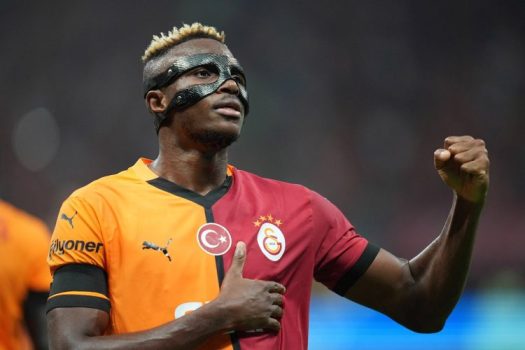Galatasaray’s Technical Director, Okan Buruk, has expressed deep concern over the injury sustained by striker Victor Osimhen during a recent Turkish Super Lig match against Kasimpasa. The 25-year-old player, who has been in fine form for Galatasaray, was instrumental in giving his team a 2-0 lead within the first 28 minutes of the match. However, following a collision with the opposing goalkeeper, Andreas Gianniotis, Osimhen signaled for a substitution, raising alarm bells regarding his fitness for both club and national duties in the near future. His injury has added to the competitive pressures of managing the team through a strenuous match schedule, with Galatasaray struggling to maintain their lead, eventually drawing 3-3.
Osimhen’s contribution to the game was significant, as he scored both of Galatasaray’s initial goals, making it a disappointing outcome for the team, especially after starting off so well. Buruk’s disappointment was palpable during his post-match comments, as he elaborated on the challenges posed by scheduling and player rotations. He reflected on the “fear of injury” and lamented that such worries are becoming ever-present in his management of the team. The tight schedule, which featured multiple matches in quick succession, left little room for error, and it pushed the players to their physical limits. Buruk emphasized that this environment creates a greater likelihood of injuries, as shown by Osimhen’s unfortunate situation.
As Osimhen briefly assuaged concerns post-match regarding the severity of his injury, the implications of his possible absence are significant as Nigeria is set to face Libya in a crucial double-header for World Cup qualification on October 11 and 15. With 22 goals in 35 appearances for the national team, Osimhen’s role is vital, and interim coach Austin Eguavoen is keen to have him available. The upcoming matches are not just crucial for his club but also for his national team aspirations, highlighting the intersecting stakes for the player. Should he be unable to participate, Nigeria could face significant challenges in their campaign, impacting their qualification hopes.
Furthermore, Buruk’s discussion points to the larger, systemic issue of player management in modern football, where the burden of fixtures can detrimentally affect squad fitness. The physical toll on players, especially in leagues where the calendar is overcrowded, raises questions about how clubs can effectively manage their rosters. The challenge is particularly acute during periods of congested schedules, where a single player’s injury can have a ripple effect on both club performance and national team prospects. Buruk illustrated that while they are trying to make tactical rotations, those decisions often do not yield effective replacements, as noted by the lack of impact from substitutes brought onto the pitch.
The intertwining problems of injuries and match fatigue reveal a pressing need for a balanced approach to player usage. This means not only focusing on skill and strategy but also taking player health into consideration. The coaching staff must navigate the fine line between optimal performance on the field and ensuring players remain fit for upcoming matches. This situation underscores the importance of adequate rest periods and the potential necessity for changes in match scheduling to mitigate risks associated with player injuries.
Ultimately, the concerns raised by Buruk highlight an ongoing dilemma in the sports world: the relentless demands placed on athletes vs. their health and performance. With Osimhen’s potential absence looming, the focus now shifts to how Galatasaray will regroup for upcoming fixtures, while Nigeria’s national team anxiously awaits news on its star striker. As clubs and federations alike strive for success, finding strategies to better protect athlete well-being is imperative for the sustainability of both club and country ambitions moving forward. As the situation develops, the ramifications of Osimhen’s injury will undoubtedly play a pivotal role in shaping the trajectories of both Galatasaray and Nigeria in their respective competitions.


